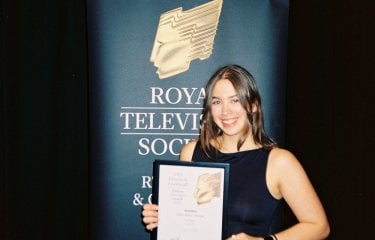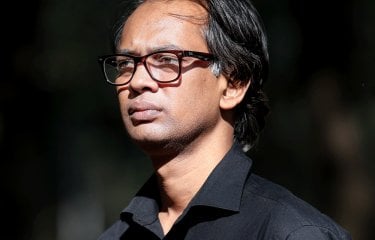How an online master's in film and television can help you to excel in the industry
28 March 2025

Film and television has a rich heritage at Falmouth. With one of the longest-running film education traditions of any university in the UK, our alumni can be found working in every part of the global film, animation and television industries.
But these industries look very different than they did fifty years ago. The rise of the internet, streaming and the rapid developments in digital technology over the past few decades have brought about massive change. Brands like Amazon and Netflix have redefined what we watch and how we watch it. The processes of developing, writing, filming and producing have been democratised, and so anyone with a smart phone and a website can make their mark in what is now a global field.
This increased access has heightened competition; more people than ever before are sharing their moving image work online and getting the attention of the public and industry professionals. The level of change within the film and television industries is only likely to increase as technology develops further, and as forward-thinking creatives find new ways to collaborate through online platforms.
The key question is: how do we learn to tap into this global network successfully? In this article we explore three ways that our online Film & Television MA can help you to excel in the dynamic world of contemporary film and television.
Get hands-on experience
The technical and conceptual aspects of filmmaking are equally important when it comes to creative production roles in the film and television industries. Although the Film & Television master’s is delivered online, the projects mirror industry workflows, and hand-ins call for practical pieces of work – be it short films, pieces of screenwriting or pre-production planning schedules. Students are supported to enhance their filmmaking craft, immersed in all the stages a producer goes through to plan out, get funding for and make a film in very granular detail.
Student Peter Chin, who is based in Malaysia, has found his experiences on the course are contributing to and honing his technical craft, as he explains: "It is truly exciting to witness your ideas develop and crystallize during the course, leading to a wide range of ideas and possibilities for production. The insights and experiences shared in this network of accomplished storytellers and industry professionals are progressively expanding and reshaping my practical journey as a filmmaker”.
Become a specialist
Within the film and television industries there are upwards of 300 different roles and responsibilities. It's important that you can demonstrate your commitment and put forward a portfolio of work that shows off your specialism; be that sound design, editing, directing or set design in order to stand out from the crowd. Research forms an integral part of the degree, granting students the opportunity to spend time absorbed in a chosen sector - one that aligns with personal interests, career plans and ambitions.
Falmouth Distinguished Professor of Film Practice and BAFTA-winner Mark Jenkin echoes the importance of finding your specialism: “The advice I would give any filmmaker is to find out what it is that you love doing. You've got to go to bed on Sunday night, excited about getting up on Monday morning to start work. Because filmmaking is difficult; it is not a life-or-death occupation, but it is tough. It makes demands on you physically, mentally, financially and emotionally. So, unless you’re at 100% when you start the process, you won’t get to the end of it, I don’t think. And that comes from being enthusiastic.”
Mark Jenkin’s latest film ENYS MEN has received glowing reviews from film critics. So, what does the award-winning director think it takes to be a successful filmmaker?
As Distinguished Professor of Film Practice at Falmouth University, Mark supports students across our School of Film & Television courses.
Discover the power of collaboration
Taught by practicing filmmakers and bolstered by guest lecturers, our Film & Television online MA is built on an experienced global network and unites diverse cohorts of students with each intake. Course leader Dr Jem Mackay’s PhD research into online collaborative filmmaking - the activity of making a film that uses the internet to network and combine the skills of individuals from across the world – underpins the master’s programme.
As he explains: “You never know who might be involved in your next job, so there is real benefit in accessing that global network and building your own networks across it. In addition to levelling the playing field, it opens the possibility of working across borders. It is becoming more embedded in the industry too, with many industry-standard applications like ProTools now integrating a collaborative online element into the user interface itself.”
Student Elissa Rosati is based in Hong Kong and sees collaboration as running deeply and conceptually into the filmmaking process, as she explains: “For me, collaboration in filmmaking is not just about working together in a team, but about the melding together of ideas presented by individuals in the service of the final story”.
Ready to make your mark with the moving image?




